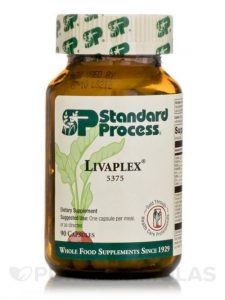
Alternative Addiction Treatment for Alcoholism: Natural and Holistic Options
By Danielle Rose
Alcoholism and addiction is often considered a disease. From this angle, as with all diseases, there is more than one way to approach a plan of healing. If recovery feels too clinical, consider working with your recovery team and adding alternative addiction treatment in order to connect and heal through the process of self-renewal.
I’ve pulled from my research and personal experience working with those recovering from addiction. In conjunction with expert clinical advice from Dr. Lisa Avila, we’ve create a shortlist of some all-natural and alternative addiction treatment methods to support a recovery program. This list is by no means all-inclusive. Additionally, these methods should not be attempted without a broader action plan and support group in place.
Alternative addiction treatment through dietary supplements
Livaplex

This whole food product from Standard Process is made with processed animal liver. As a supplement, Dr. Lisa Avila said it targets, nourishes, and directly supports the liver. Lisa recommends it to support for the hard work the liver must undergo during, and while recovering from, addiction. She adds that it also provokes and promotes liver detox.
Blood Sugar Control
When the body is under stress caused by addiction, particularly alcohol addiction, Lisa said it is imperative to control the body’s cravings for fast sugar. This craving for sugar is the physiological need for alcohol. When blood sugar drops, cravings are an attempt by the body to reestablish a sense of balance. This makes the most important meal of the day even more important for those who want to stabilize the body’s use of, and craving for sugar (ie: alcohol).
Reducing sugar in the body can cut about 50% or more of an alcoholic’s cravings, Lisa said. This means eliminating most sugar, particularly processed sugar, from the diet prior to, and while undergoing detox and recovery. Eating regularly and including protein each time you eat can help reduce the blood sugar spikes that result in the sugar cravings that acerbate the physiological desire to drink.
Herbs for spiritual and physical healing
Physiology is one of many contributors to alcoholism, and therefore addressing the body only addresses part of the problem. That’s why the herbs mentioned below also list their emotional and energetic benefits. In this way, herbs can help recovery without needing to actually ingest them—simply having the herb nearby, or meditating on the plant could be sufficient to benefit from their energetic qualities.
Ashwagandha
Ashwagandha is a well-known and well-rounded herb for anti-stress and anxiety. Studies have also found that it can reduce symptoms of withdrawal, and reduce cravings in alcoholic mice. In Chemistry of Addiction, posted earlier this week, we discussed the connection between impulsiveness, ADHD and addiction. Perhaps this is how, by working with the central nervous system, ashwagandha has the potential to ease the physical and mental pain of recovery. Regardless of how it works, the benefits of this powerful and nourishing herb can only be a support to a body and mind struggling through a renewal such as overcoming addiction.
Robin Rose Bennett’s Super-Soother Oat Tincture Blend
Teacher, renowned herbalist, and student of Susun Weed, Robin Rose Bennett, indicates a mixture of several herbs for many stress-related conditions, including addiction recovery. I suggested this blend to a friend who was recovering from opioids. This was not his first time detoxing, and he was amazed by how quickly and easily he moved through detoxification.
These herbs, as outlined in Robin’s book, The Gift of Healing Herbs, work with the central nervous system to calm, heal, and reconstruct broken or frazzled pathways. I have used one of the herbs in this blend, oatstraw, on many occasions to help me “go with the flow”. It has done this ten times over throughout situations that would have normally had me reeling. Skullcap is one of the only nervines that stops me from clenching my teeth, or spinning off in a rage when my body, mind and soul are completely spent. The herb in this mixture that I have seen provide the most powerful and consistent benefit in recovery, however, is motherwort.
Motherwort
This gentle herb has the ability to support heart health, safely lower blood pressure, support the liver, improve bile production, and very gently relax both body and mind. I have seen it immediately quell a panic attack and ease heart palpitations related to alcohol withdrawal. It works gently and almost instantly in many situations. It is a great herb to have on hand for everything from headaches to digestion, and even menstrual cramps. If I could have only one herb when it comes to relief of the myriad mental and physical effects of withdrawal, however, this would be it.
Burdock
Lisa suggests burdock for supporting the liver and kidneys, which in and of itself makes it a powerful ally for those battling addiction. Burdock has a grounding, almost balancing effect on the system, Lisa said, and even provides pain relief in certain doses. It is soothing, and it works on the emotional body to process anger–a liver-based emotion. If dosed correctly, burdock can also soothe other kinds of emotional distress, as well.

Feeing connected, and being nourished inside and out is an important part of any recovery and renewal plan. Art by Kerstin Zettmar
Other alternative addiction treatment options
Yoga
Because yoga allows the person practicing it to slow down and be present, it can benefit any addiction recovery plan. In fact, this study, published in 2013 has found that mindfulness practices such as yoga can help break the cycle of addiction at various points. Restorative yoga is one of the many highly gentle yoga practices that resonate with both body and mind. Although slightly more vigorous, kundalini yoga helps raise and connect a person with his or her personal, spiritual energy. Kyla Rose Maher of Long Time Sun Apparel speaks on how kundalini yoga helped her recover from addiction in Mind Key’s November 2016 issue.
Malia Bradshaw has a guided savasana video that may provide for immediate relief. Her videos are perfect for those who want stress relief from home. They can also benefit those unmotivated or unable to participate in a yoga class or structured practice. This deep relaxation meditation is specifically geared towards anxiety and stress. It can also help those struggling with addiction to relax and focus on redirecting their thoughts:
Traditional Therapy
Philadelphia-based therapist, Majet Reyes, M.S. said trauma is often an underlying cause of addiction.
“An addictive behavior is the desire to forget or escape, numb or soothe emotional pain and feel safe or in-control,” Majet said.
Although the intention is to feel good, once the behavior becomes addictive, it becomes self-destructive. Understanding the “why” behind the behavior is a step toward healing. This allows someone suffering from addiction to face the shame, guilt and loss associated with addictive behavior, Majet said.
“Trauma therapy or trauma focused counseling helps individuals process the emotional and psychological traumas that happened in the past.” Majet said. “Alternative addiction treatment and other forms of wellness activity are great tools to have, but processing your traumas is important to overcome shame, guilt and loss.”
Healing drunken angels
“Angels in the Drunk Tank” is a quote from Dr. Tom Goode about the true nature of those suffering from addiction. Alcoholics are highly spiritual beings who have trouble functioning in a world that makes no sense to them, Goode said. Alcoholism and addiction are, in part, a result of finding that the real world has become difficult without continual “breaks”. As a result, they retreat into addiction as an escape or soother in absence of spiritual and emotional training. The therapy that Dr. Goode provides is metaphysical counseling. This, coupled with full wave breath teaches these spiritual beings how thrive with out an addictive need to escape.
Learn more about Dr. Goode and full wave breath in Lisa’s post: Sexual Dysfunction: A physical or energetic representation of health?



 There is more than one way to approach addiction. Alternative addiction treatment ranges from self-care, to talk therapy and herbal and dietary supplements.
There is more than one way to approach addiction. Alternative addiction treatment ranges from self-care, to talk therapy and herbal and dietary supplements.  There is more than one way to approach addiction. Alternative addiction treatment ranges from self-care, to talk therapy and herbal and dietary supplements.
There is more than one way to approach addiction. Alternative addiction treatment ranges from self-care, to talk therapy and herbal and dietary supplements.